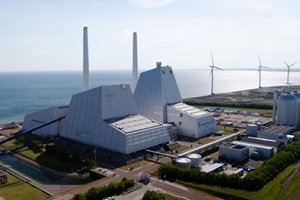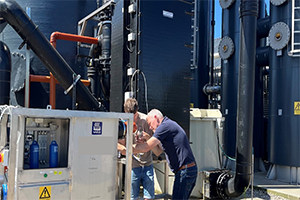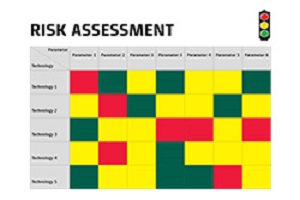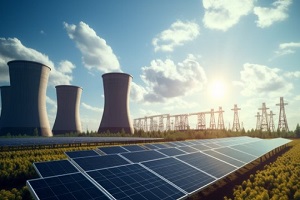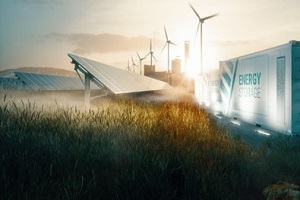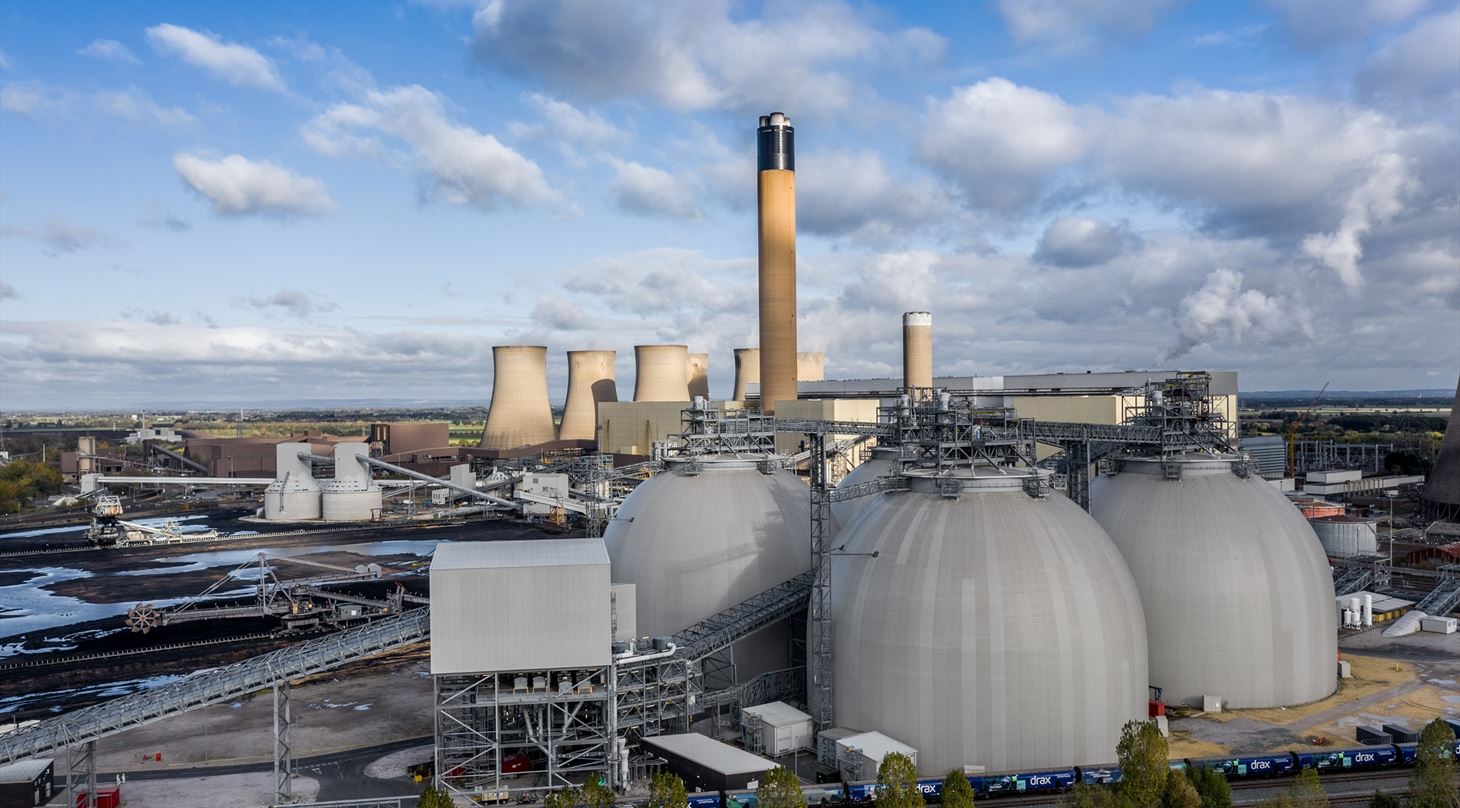
CCUS – developing and validating the technologies needed for Carbon Capture Utilization and Storage
Capture, transport, storage, and utilization of CO2 (CCUS) is a central element in Denmark's goal to reduce greenhouse gas emissions by 70% by 2030 compared to 1990.
Both the state and companies in Denmark are therefore investing heavily in creating a new CCS value chain that can capture and store more than 3 million tons of CO2 annually from 2030 and onwards. Further investments are being made in CCU and in using CO2 to produce synthetic e-fuels through Power-to-X technologies, thereby reducing greenhouse gas emissions from industries that have no other alternatives.
We advise, test, and develop within several core areas
Danish Technological Institute assists in developing, maturing, and implementing the current and next generation of technologies within CCU and CCS. At the same time, we play a central role as a bridge between the latest research and the industry's need for implementable technology that ensures the green transition of Danish businesses and their continued strong competitiveness.
This is achieved, among other things, through participation in and leadership of Danish and international projects and partnerships within CCUS, as well as building a significant network and updated know-how about trends and tendencies. In addition, we possess strong expertise in a range of converging technology areas such as air, materials, energy, and energy systems, among others. Therefore, we can offer a range of services grounded in our knowledge of value chains and competencies within energy, materials, and environmental technologies.
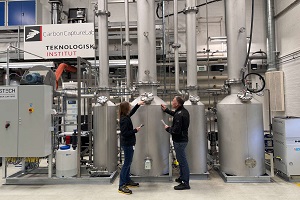 CarbonCapture Lab and implementation of capture technology
CarbonCapture Lab and implementation of capture technology
Selecting and implementing the best capture facility can be a challenge, as there are various methods with differing efficiency and technical suitability. We have built Denmark's first flexible test facility to test CO2 capture technologies from biomass combustion, allowing us not only to advise and calculate theoretically but also to measure and screen real operating situations.
Read more about our test facility for CO2 capture technologies >>
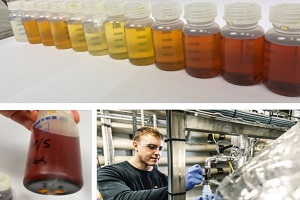 Solvent degradation in connection with Capture Facilities
Solvent degradation in connection with Capture Facilities
Understanding the chemical properties and degradation of solvents is essential for the maintenance and costs associated with a capture facility. We test how, when, and why solvents degrade over time or as a function of impurities in the CO2 source.
Contact Jan here on this page to learn more about our testing and advisory services regarding solvent degradation..
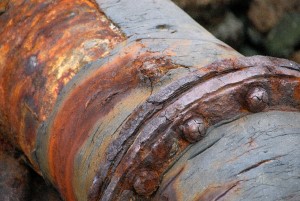 Corrosion testing of metals in the selection of materials and equipment for CCUS
Corrosion testing of metals in the selection of materials and equipment for CCUS
Before a product is launched on the market, it may be relevant to test the resilience of one or more materials against each other, assess the quality of a corrosion-protective coating, or evaluate a product according to an industry-specific standard.
See how we can assist you with corrosion testing and consulting >>
Read about our work within biocorrosion >>
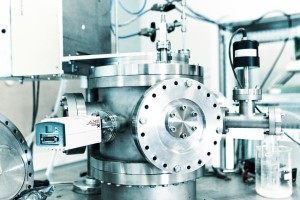 Testing and validation of plastic materials for CCUS tasks
Testing and validation of plastic materials for CCUS tasks
The selection of materials for CCUS applications presents several challenges due to the corrosive nature of CO2, high pressure requirements, wide temperature range, and the need for long-term durability and cost-effectiveness. We have laboratories to test how supercritical and liquid CO2 affects materials.
Learn more about what we can offer in material testing >>
CE marking of equipment
Carbon capture facilities must be CE marked and may be subject to the regulations of the Machinery, Pressure Equipment, and ATEX directives. At Danish Technological Institute, we specialize in identifying legal requirements related to these directives and guide you safely through the CE marking process. Additionally, we can assist with obtaining certification and issuing certificates through Dancert.
Here's how we can help you safely navigate the CE marking process >>
CO2 quality and impurities
CO2 quality and impurities, such as NOx, SOx, NH3, CH4, H2S have a direct impact on the safety and efficiency of the CCUS process, leading to such as corrosion in pipelines, affecting phase behaviour of CO2 during injection during compression and storage. CO2 if applied in PTX utilization, must also meet high quality requirements to avoid affecting the PTX conversion process, which often involve catalysts.
How we can help with CO2 quality, impurities and monitoring >>
 Safe and efficient CO2 monitoring in CCUS infrastructure
Safe and efficient CO2 monitoring in CCUS infrastructure
It is important to ensure that the CO2 stored in the Danish subsurface remains there. Therefore, the authorities have set requirements for monitoring potential CO2 leaks from future geological storage sites. Danish Technological Institute have expertice in development and implementation of technology for monitoring potential CO2 emissions. We provide guidance on the selection of technologies, develop new solutions, and design monitoring programs.
Learn more about CO2 monitoring systems >>
Risk analysis of CCUS technologies
Many CCUS technologies are new or need to be implemented in innovative solutions, which creates technological risks. Danish Technological Institute provides independent expert advice on CCUS, based on detailed assessments of the technical design, performance data, and track record of individual components as well as the overall solution.
Contact Jan to learn how we can provide you with insights into the performance and reliability of technologies under real-world conditions.
Strategic and technological consulting in CCUS
We are ready to assist you with strategic advice on due diligence of CCUS technologies, maturity assessment of solutions, and mapping of TRL as well as roadmaps for CCUS technologies. Additionally, we provide technological consulting on, among other things, Energy Technology and Environment, Air Quality, and Odor - chemical measurement and analysis.
Contact Jan on this page to learn how we can assist you.
CCU and Power-to-X
There is great interest in finding ways to capture, store, and utilize CO2 sustainably. CO2 has many possible applications in industry and society. Danish Technological Institute is highly focused on Power-to-X technologies, and we can advise you on advanced materials and Power-to-X.
Learn more about our work with Power-to-X (in danish) >>
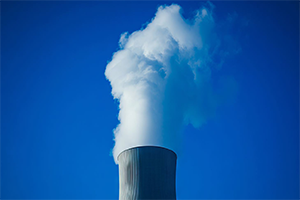 Emissions from carbon capture and cleaning technologies
Emissions from carbon capture and cleaning technologies
Carbon capture using amines could lead to unintended emissions of amines and their by-products, such as nitrosamines and nitramines into the surrounding environment.
See our projects on measurements methods and quantifying emissions >>
Video: Testing of Materials for CO2 Transport and Storage (Subtitles available in Danish or English)
Online map of Carbon Capture, Utilization and Storage activities in Denmark
An increasing number of companies, knowledge institutions, authorities, organizations and initiatives are active within carbon capture utilization and storage in Denmark. The development is going very fast with large investments being made. Danish Technological Institute has therefore made the first online map which gives an overview of the activities to support a fast development of CCUS in Denmark.
We actively participate in the development of the CCUS Field
Danish Technological Institute is involved in several major national initiatives and projects within CCUS. This gives us deep insight into the development of CCUS at all levels - from national and international political trends to developments in specific technologies, as well as expectations for upcoming requirements and standards relevant to CCUS. Danish Technological Institute participates in a number of committees and projects, including:
Project Greensand – CO2 Storage in Decommissioned Oil Fields
Project Greensand is an important step towards achieving climate goals. The project aims to reduce CO2 emissions in the atmosphere by storing captured CO2 in the North Sea's subsurface. Read more about Project Greensand and Danish Technological Institute's role here.
Other projects
- INNO-CCUS
- EcoClay
- Power-to-X government contract
Effective reduction of toxic by-products from amine-based carbon capture plants
What is CCUS?
CCUS is an acronym for Carbon Capture, Storage and Utilization, i.e. the capture, storage and utilization of CO2.

